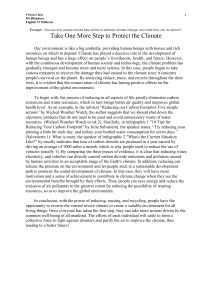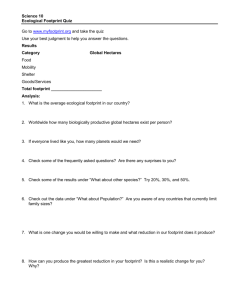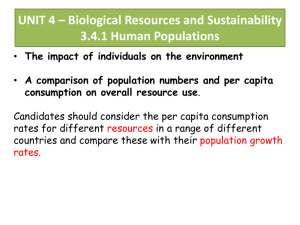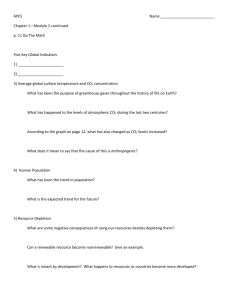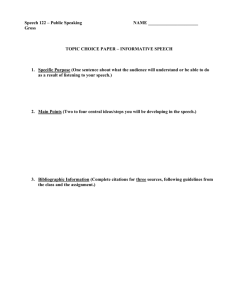documentation of evidence
advertisement
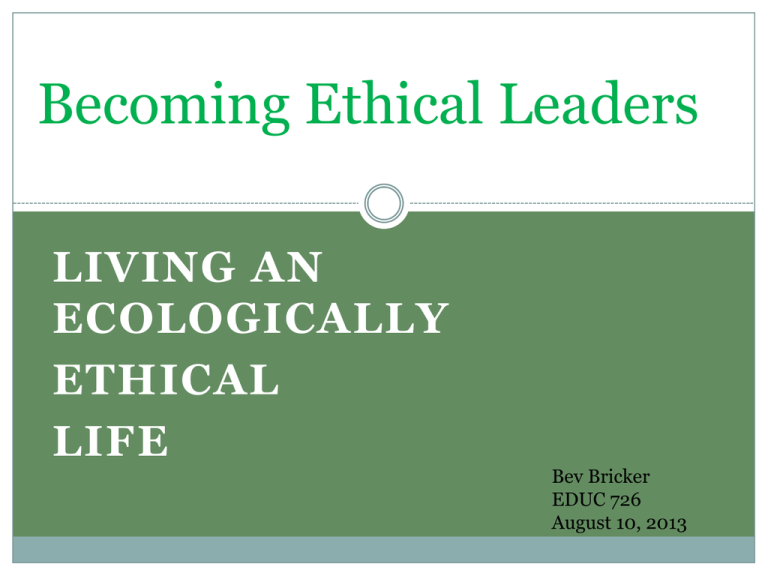
Becoming Ethical Leaders LIVING AN ECOLOGICALLY ETHICAL LIFE Bev Bricker EDUC 726 August 10, 2013 Http://bevbricker.polldaddy.com/s/climate- change.org Results: https://polldaddy.com/quizzes/2003385/report bevbricker, EdD Our Impact Inevitably, in going about our daily lives, (commuting, sheltering our families, eating) each of us contributes to the greenhouse gas emissions that are causing climate change. Yet, there are many things each of us, as individuals, can do to reduce our carbon emissions. The choices we make in our homes, our travel, the food we eat, and what we buy and throw away all influence our carbon footprint and can help ensure a stable climate for future generations. What is my carbon footprint? http://goo.gl/c4xIND http://tinyurl.com/6j6vot To shorten a url go to http://goo.gl/ http://tinyurl.com/ The Ecology of Commerce Ray C Anderson, CEO Interface, Inc. As his company’s carbon footprint was reduced profits increased. Ray in his own words Ray C Anderson Impact=Population + Affluence + Technology I=P+A/T I=P + a / T+ Happiness Redefining Affluence It is our idea of economics and progress that actually impoverish people We need new ways to measure wealth. Ways that put value back into community, air, water and the richness of life around us. “From Naked Ape to Super Species” A person perspective on humanity and the global eco-crisis. David Suzuki and Holly Dressel IS THERE AN OBLIGATION TO REDUCE ONE’S INDIVIDUAL CARBON FOOTPRINT? Support from Hindu Beliefs Hindu religion wants its followers to live a simple life. People are meant to learn to enjoy spiritual happiness, so that to derive a sense of satisfaction and fulfillment, they need not run after material pleasures and disturb nature's checks and balances. Ranchor Prime for the Alliance of Religions and Conservation. Support from Jewish Faith Humans are the stewards of the Garden of Eden. They are looking after it for God, not for themselves. Underlying the Jewish ethic, it is the belief that humans are "only tenants on this earth. The land belongs to God. We are given permission to enjoy the Creator's abundant gifts, but we must not waste or wantonly destroy anything. Support from Islamic Faith "Created beings are the dependents of God, and the creature dearest unto God is he who does most good to God's dependents," it says. Humans' good deeds therefore, "are not limited to the benefit of the human species but rather extend to the benefit of all created beings." Human beings are seen in Islam as stewards of the environment. Humans are "only a manager of the earth and not a proprietor." There is among Muslims an appreciation of a profound duty to protect the Earth, many believe. The belief system is not just based on what humans do now, more what they set up for humans to come. Support from Christian Organizations A Sierra Club 2008 survey found: 67 percent of Americans said they care about the environment because it is "God's creation." The Vatican that same year labeled pollution a sin Southern Baptist Convention leaders called for believers to combat climate change. In the Charlotte area, people of faith say their religious convictions go hand in hand with protecting the earth. Support from Buddhism Buddhism is viewed by many as the most environmentally-friendly religion of them all. Strong belief in the fundamental equality of all sentient beings: We are all born, we all age, then we all die. There is no reason therefore, why a human's experience specifically should be any more important than that of a pig or a cow. All beings deserve equal levels of empathy – otherwise known as 'loving-kindness.' The Power of Green Tom Friedman scalable, clean, emissions, free power A Green Economy Copenhagen is working to be the world's first carbon-neutral capital by 2025 Using seawater to cool air for When a community commits to sustainability, life becomes healthier, more prosperous and more fun. A/C Wind turbines to generate electricity Geothermal use and replacing coal with wood chips and straw for heating Retrofitting building to meet new energy standards Replacing cars with bikes (a new bike superhighway makes commuting faster on a bike) Changes are Happening: In Business Lowell McAdam - Verizon Our goal is to cut in half our carbon intensity – the amount of energy needed to move data across Verizon’s networks -- by 2020. We’re using our 2009 carbon intensity level as the benchmark and the starting point for our goal. Our Human Footprint How Much Is Left? Scientific American Changes are Happening: In Construction Fernando Pagés Ruiz Sustainable builder of affordable homes. Changes are Happening: In Education Training the Leaders of Tomorrow Columbia University – Master of Science in Sustainability Management. Teaching video games gardens Green Education Foundation, 2011 Is there an obligation to reduce one’s individual carbon footprint? Anne Schwenkenbecher found three main excuses that are used: 1. the view that individual emissions cause no harm 2. the view that individual mitigation efforts would have no morally significant effect 3. the view that lifestyle changes would be too difficult The Obligation of Educators Just as Madison Avenue has consistently delivered the message of consumerism, we need to just as consistently present a marketing campaign of the moral responsibility we all hold for our planet. Reasons to Alter Habits What if there were more positives than negatives for reducing your carbon footprint? 1. Save money 2. Increase happiness quotient 3. Better health 4. Life becomes enjoyable Simple Things You Can Do…. Eating Less Meat And Junk Food Could Cut Fossil Energy Fuel Use Almost In Half Science News... July 24, 2008 — Study finds a healthier diet and a return to traditional farming can help reduce energy consumption in US food system by 50 percent. Living Sustainably. If We Are What We Eat, Who Are We?" Healthy Foods with Pollan and Moss More Ideas Reduce, Reuse, Recycle Change a Light Bulb Buy Energy-Efficient Products Use Less Hot Water Plant a Tree Do a Home Energy Audit Encourage Others to Conserve A Blog written by Emily Chase Lapine age 10 Saving Our Environment: How One Person Can Make a Difference stop buying CDs and download music to your I-Pod or MP3 player buy stuff and sell stuff on Ebay More Ideas Carpool. Walk or ride a bike. Shop by phone or mail. Ride public transit. Telecommute. Drive Less and Drive Smart Accelerate gradually. Use cruise control on the highway. Obey the speed limit. Combine your errands into one trip. Keep your car tuned and support the Smog Check Program. Don't top off at the gas pump. Replace your car's air filter. Keep your tires properly inflated. Report smoking vehicles. Look for the most efficient, lowest polluting model or even a zero-polluting electric car. Drive your newest car. Newer cars generally pollute less than older models. More Ideas Select products that are water-based or have low amounts of volatile organic compounds (VOCs). Use water-based paints. Look for paints labeled zero-VOC. Paint with a brush, not a sprayer. Store solvents in air-tight containers Microwave small meals. Use a push or electric lawn mower. More Ideas Use Less Heat and Air Conditioning Use a programmable thermostat that automatically turns off the air conditioner or heater when you don't need them. Add insulation to your home. Use a fan instead of air conditioning. Use an EPA-approved wood burning stove or fireplace insert. Insulate your water heater. Install low-flow shower heads. Choose recycled products. Reuse paper bags. Recycle paper, plastics, and metals. Choose products with recyclable packaging Print and photocopy on both sides of paper. Turn off the lights when you leave a room. One Person Can Make A Difference I am personally convinced that one person can be a change catalyst, a transformer in any situation, any organization. Such an individual is yeast that can leaven an entire loaf. It requires vision, initiative, patience, respect, persistence, courage, and faith to be transforming leader. - Stephen R Covey Never doubt that a small group of thoughtful, committed citizens can change the world. Indeed, it is the only thing that ever has. – Margaret Mead What Changes Will You Make? References CNN, All About: Religion and the environment http://www.cnn.com/2008/WORLD/asiapcf/01/27/eco.about.religion/ January 28, 2008 King, W.C. (2013) Copenhagen and the Non-Environmental Benefits of Sustainability Albright Stonebridge Group • Nature. http://www.nature.org/greenliving/carboncalculator/index.htm Scientific American. (2010). How Much is Left ? http://www.scientificamerican.com/article.cfm?id=interactive-how-much-is-left Schwenkenbecher A. (2012) Is there an obligation to reduce one’s individual carbon footprint? Critical Review of International Social and Political Philosophy. p. 1-21 Suzuki, D. & Dressel, H. (1999) From Naked Ape to Super Species: A person perspective on humanity and the global eco-crisis. Toronto: Stoddart
